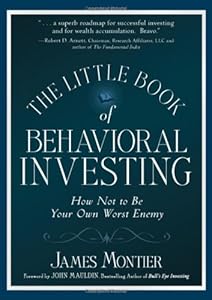“Prepare, plan and pre-commit to a strategy”
However astute an investor believes himself to be, he is weakened by the “empathy gap,” a human being’s inherent inability to predict his own behavior in the heat of the moment. It’s easy to take logical decisions when everything’s going our way but under pressure, the best of us can crack, in terribly embarrassing ways at times.
In the first chapter of The Little Book of Behavioral Investing: How not to be your worst enemy, James Montier elucidates on the human traits that condemn us to self-punishing propensities. First, we suffer from the empathy gap. And if that’s not enough, we also bear the brunt of procrastination – that frustrating but inevitable habit of pushing things to the last moment.
Life, in general, is very forgiving of these foibles. However, the market is a heartless beast. Markets do not care about you, your family or your feelings. If you truly want to become a better investor there’s no way around it; you’ve got to deal with procrastination and empathy gap. Montier suggests a strategy: Prepare and pre-commit. Let’s see what this means.
Pay special attention to planning and preparation techniques while devising your investment strategy. For starters, conduct your research when the market is neither here nor there and the chances of your getting upset or excited are minimal. A cold, rational state of mind is ideal for unemotional observations, drawing logical conclusions and analyzing situations and markets. It’s the perfect time to chalk out an action plan that covers your best and worst “what-if” scenarios.
When you think about it, the worst place to look for research is CNBC and financial media in general. The ad-based business model of media companies motivates them towards the sensational. It’s better for them to focus on Who, What, Where, When, Why, and How rather than the boring and mundane process of actually reading a prospectus or balance-sheet.
Now, why should you prepare and pre-commit? To stop you from taking an original decision in the throes of a volatile market scenario. The trading floor is not the place to follow your instinct. Instead, follow the pre-decided action plan and blindly follow instructions. That’s how you prevent transient emotion or group behavior from influencing your buy or sell decisions.
Now, like a lot of things we read, this may sound easy. But it’s anything but, believe me.
A bad investment choice is like falling for a guy everyone warns you about because your heart thinks your brain is a pessimist. When you’re blindly in love, you can’t imagine it otherwise. And when you’re deep in the dumps, it’s hard to imagine being happy again. Pre-committing to an investment plan may trigger similar reactions. Your C and X systems may lock in constant battle while nightmares of horrific “what-if” situations may mess with your blood pressure. But stick to it. Training your C system will take time and perseverance.
If you need motivation, history is replete with examples of bad investment choices. The dot-com bubble brought umpteen businesses and investors to the point of bankruptcy and pushed many into oblivion. Greed, shortsightedness, and hurried decisions cost investors heavily.
And then there are people like Sir John Templeton, legendary investor and mutual fund pioneer. He made his buy decisions well in advance of sell off periods, giving standing instructions for his brokers to execute under pre-imagined situations. He kept himself out of the buying/selling process.
If a man as seasoned as Sir John didn’t trust himself to take the right decision under stress, I’m sure we can’t afford the confidence. So set your emotions aside and pre-commit to a thoroughly planned investment strategy.
One way StockViz helps you pre-commit to a strategy is through Investment Themes. Each Theme follows a specific model for portfolio construction and can be mapped to your portfolio so that changes in the Theme get reflected on your account. Call us to find out how it works: +91 80 2665 0232 or email us at info@stockviz.biz
Monica Samuel is doing a chapter-wise review of the book: The Little Book of Behavioral Investing: How not to be your worst enemy by James Montier. You can follow the series by following this tag: tlbbinvesting or by subscribing to this rss feed: tlbbifeed








